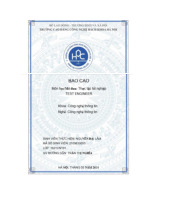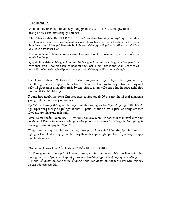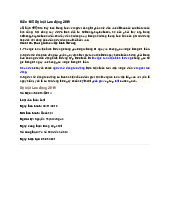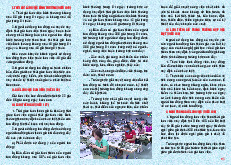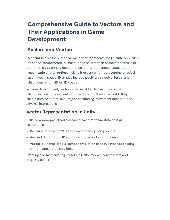






Preview text:
Kimnhungtoeic.com mshanhtoeic@gmail.com
---------------------------------------------------------------------------------------------------- TENSES – CÁC THÌ
1. The simple present (Thì hiện tại đơn)
a. Formation: I, We, You, They + V1 (động từ nguyên mẫu không “to”)
He, She, It + Verb –s/es (V1 thêm s/es) b. Usage:
Thì HTĐ diễn tả một chân lý, một sự thật hiển nhiên.
The Earth goes around the sun. He is a doctor. Tom comes from England.
Thì HTĐ dùng để diễn tả một thói quen, hoặc một việc xảy ra ở hiện tại (Trong
câu thường có trạng từ chỉ tần suất: always; usually; often; sometimes; seldom;
rarely; every day/ week...)
He often goes to class late.
My mother gets up early every morning.
What do you do every night?
2. The present continuous (Thì hiện tại tiếp diễn) a. Formation: I + am
We, You, They + are + Verb-ing He, She, It + is b. Usage:
Để diễn tả một hành động đang tiếp diễn ở thời điểm nói hay xung quanh thời
điểm nói. (thường được đi kèm với các dấu hiệu: now, right now, at the moment, at the present...)
I am reading an interesting novel.
Be quiet! The baby is sleeping in the next room.
Để diễn tả một hành động sẽ xảy ra ở tương lai có kế hoạch từ trước.
What are you doing tonight?
Are you playing football tomorrow?
Note: Một số động từ thường không dùng thì hiện tại tiếp diễn mà dùng ở thì hiện tại
đơn mặc dù nó diễn tả hành động đang xảy ra vào lúc nói. Đó là những động từ trạng
thái: be, see, hear, feel, taste, know, understand, like, hate, want, need, love, prefer,
remember, forget, realize, believe, seem, suppose...
Thì HTTD sử dụng với “always” diễn tả một thói quen xấu của người khác hay
một sự việc lặp đi lặp lại quá mức bình thường ở thời điểm hiện tại khiến người
nói có thái độ bực mình.
She is always forgetting to return the money she borrows me.
Kimnhungtoeic.com mshanhtoeic@gmail.com
----------------------------------------------------------------------------------------------------
John is always coming late.
3. The present perfect (Thì hiện tại hoàn thành)
a. Formation: I, We, You, They + have + Past Participle (Verb-ed/V3)
He, She, It + has + Past Participle (Verb-ed/V3) b. Usage:
Để diễn tả một hành động vừa mới xảy ra (Thường đi kèm với các từ just, recently)
The train has just left the station.
She has finished her homework recently.
Để diễn tả một hành động xảy ra trong quá khứ nhưng không rõ thời gian, thường
đi kèm với các từ “not...yet”, “yet”, “never”, “ever”, “already”, “before”
We haven’t finished our homework yet.
Has your father come yet?
I have already watched that film.
Để diễn tả hành động bắt đầu từ quá khứ mà còn kéo dài đến hiện tại, hoặc tác
động đến hiện tại và có khả năng tiếp tục ở tương lai, thường đi với các từ “since
+ mốc thời gian”, “for + khoảng thời gian”.
They have lived here since 1990.
Tim has been sick for a week.
Ngoài ra còn có một số cụm từ chỉ thời gian như: so far, until now, up to now, up
to the present đi kèm với thì hiện tại hoàn thành và đều có nghĩa “cho đến bây giờ”
4. The present perfect continuous (Thì hiện tại hoàn thành tiếp diễn)
a. Formation: I, We, You, They + have + been + Verb-ing
He, She, It + has + been + Verb-ing
b. Usage: Để nhấn mạnh 1 hành động khởi sự trong quá khứ, kéo dài đến hiện tại và còn tiếp tục ở tương lai.
She has been waiting to see you since 2 o’clock.
He has been working in this factory for 4 years.
5. The simple past (Thì quá khứ đơn)
a. Formation: I, We, You, They + Verb-ed/ V2 He, She, It
b. Usage: Để diễn tả hành động đã xảy ra trong quá khứ có xác định thời gian, thường
kèm theo các từ chỉ thời gian: yesterday, ago, last night/week/month/year..., in
1989,...Hành động đó đã chấm dứt trong quá khứ hoặc là một thói quen trong quá
khứ, giờ không còn nữa.
Yesterday, he went home late.
He stopped smoking a month ago.
Kimnhungtoeic.com mshanhtoeic@gmail.com
----------------------------------------------------------------------------------------------------
She worked here for 10 years from 2000 to 2010.
6. The past continuous (Thì quá khứ tiếp diễn)
a. Formation: I, He, She, It + was + Verb-ing
We, You, They + were + Verb-ing b. Usage:
Để diễn tả hành động đã xảy ra và kéo dài hoặc đang xảy ra vào một thời điểm xác định trong quá khứ.
What were you doing at 5 p.m yesterday?
Để diễn tả hành động đang xảy ra ở quá khứ thì có hành động khác xen vào.
When he came, we were watching television.
What was she doing when you saw her?
Để diễn tả hai hành động tiếp diễn xảy ra cùng lúc ở quá khứ.
Yesterday, while I was reading a book, my sister was watching TV.
7. The past perfect (Thì quá khứ hoàn thành)
a. Formation: Subject + had + past participle (Verb-ed/V3)
b. Usage: Để diễn tả hành dộng xảy ra trước 1 hành động khác trong quá khứ hoặc
trước 1 thời điểm ở quá khứ.
Before 1975, he had worked at that company.
When I got up this morning, my mother had already left.
8. The past perfect continuous (Thì quá khứ hoàn thành tiếp diễn)
a. Formation: Subject + had + been + Verb-ing
b. Usage: Để nhấn mạnh một hành động xảy ra và kéo dài trong quá khứ cho đến khi
có hành động quá khứ thứ hai xảy ra (hành động này dùng simple past) và thời gian
kéo dài thường nêu rõ trong câu.
They had been playing card for 2 hours before I came.
9. The simple future (Thì tương lai đơn)
a. Formation: I, We + shall/will + verb (bare-infinitive)
He, She, It + will + verb (bare-infinitive)
b. Usage: Để diễn tả một hành động sẽ xảy ra ở tương lai với:
- Quyết tâm: I’ll go with you however the weather may be.
- Hứa hẹn: I will always love you.
I’ll tell him. Don’t worry!
- Thiện chí: I’ll be very glad to do that for you.
Thường đi kèm với: some day, tomorrow, next week/month/year....
He’ll come back next week.
She won’t go there tomorrow.
Kimnhungtoeic.com mshanhtoeic@gmail.com
---------------------------------------------------------------------------------------------------- 10. Be going to a. Formation: I + am
He, She, It + is + going to + verb (bare-inf) We, You, They + are
b. Usage: Để diễn tả một hành động sắp xảy ra, mà hiện tượng của nó đã xuất hiện ở
hiện tại hoặc diễn tả một hành động tương lai có dự định từ trước.
Look at the dark sky, it’s going to rain.
Where are you going to spend your vacation?
11. The future continuous (Thì tương lai tiếp diễn)
a. Formation: Subject + will + be + verb-ing
b. Usage: Để diễn tả hành động sẽ đang xảy ra tại một thời điểm tương lai.
He will be studying abroad at this time next year.
12. The future perfect (Thì tương lai hoàn thành)
a. Formation: Subject + will + have + past participle (Verb-ed/ V3)
b. Usage: Để diễn tả mọt hành động sẽ hoàn tất tại một thời điểm tương lai; thường đi
kèm với by then; by the time; by + mốc thời gian.
They’ll have built that bridge by May next year.
Lan’ll have graduated by August this year.
By next month, I will have left for Singapore.
KIMNHUNGTOEIC.COM
mshanhtoeic@gmail.com
----------------------------------------------------------------------------------------------------------------------------------
EXERCISES 1 – Simple Tenses
Give the correct form of the verbs: Simple Present, Simple Past, Simple Future.
1. The Earth ...................... (circle) the Sun once every 365 days.
2. Every morning, the sun .................... (shine) in my bedroom window and .............. (wake) me up.
3. The apartment was hot when I got home, so I .......... (turn) on the air conditioner.
4. The River Nile ...................... (flow) into Mediterranean.
5. This book is mine. That one ............................ (belong) to Peter.
6. A: My two children don’t get along. It seems they are always fighting about something.
B: Don’t worry. It will be better when they ..................... (grow) up.
7. ........................(you, meet) Tom at the party last night?
8. We usually .............. (grow) vegetables in our garden.
9. I ............... (be) here next week. I ................... (attend) a seminar in Los Angeles. Mr. Han
.............. (teach) for me. When I ................ (return), I will expect you to be ready for the midterm exam.
10. The last time I .......... (go) to Brighton was in August.
11. The house was very quiet when I ............. (get) home.
12. We ................. (arrive) at work in the morning and ............. (find) that somebody had broken
into the office during the night. So we .............. (call) the police.
13. Yesterday I ............. (go) to my daughter’s dance class. I had never been to a dance class
before. I .................. (not take) dancing lessons when I ........... (be) a child.
14. A: What time .................... (your train/ leave) tomorrow?
B: 7:30 in the morning. It ............. (get) into Paris at 11:20.
15. A: Let’s go to the carnival.
B: Yes, good idea. I expect it ......... (be) fun.
16. A: Oh, I have just realized. I haven’t got any money.
B: Haven’t you? Well, don’t worry. I ................... (lend) you some.
17. A: I’m just going out to get a paper.
B: What newspaper .................. (you/buy)?
18. I ............ (meet) you at the airport tomorrow. After you ................ (clear) customs, look for me just outside the gate.
19. A: When ............... (you, leave) for Florida? B: Tomorrow.
20. A: I ................ (call) you this afternoon.
B: OK. But don’t call me between 3:00 and 5:00 because I ................ (be) home.
KIMNHUNGTOEIC.COM mshanhtoeic@gmail.com
----------------------------------------------------------------------------------------------------------------------------------------------
EXERCISES 2 - Continuous Tenses
I. Put the verbs into the Simple past and V-ing form: Clap Dry Chase Stop Cry Erase Step Carry Prepare Open Marry Retire Pick Delay Move Help Play Arrive Call Display Die Clean Narrow Lie Cook Plow Tie
II. Put the verbs into the correct form: simple present/ simple past/ simple future/ present
continuous/ past continuous/ future continuous.
1. Listen! I ............. (think) someone ................ (knock) at the door.
2. When Don arrived, we ................. (have) coffee.
3. The students .................(play) a game when professor ................. (arrive).
4. While he ..................... (walk) in the mountains, Henry ............... (see) a bear.
5. A: What ................. (you, do) this time yesterday?
B: We .............(drive) to London, but on the way we .............. (hear) about a bomb attack
in Oxford Street. So we .................. (drive) back home straightaway.
6. The number of vehicles on the road .................... (increase).
7. It ..........(be) cold when we .............. (leave) the house that day, and a light snow .................. (fall).
8. Mrs. Green always ............. (go) to work by car, but this week she ................ (travel) by bus.
9. I .............(call) Roger last night, but he ................. (not, be) at home. He .............. (study) at the library.
KIMNHUNGTOEIC.COM mshanhtoeic@gmail.com
----------------------------------------------------------------------------------------------------------------------------------------------
10. I ...........(see) Sue in town yesterday but she .............. (not, see) me. She ............. (look) the other way.
11. I ........ (meet) Tom and Ann at the airport a few weeks ago. They ............(go) to Berlin
and I ........ (go) to Madrid. We .........(have) a chat while we .......... (wait) for our flights.
12. I .............. (cycle) home yesterday when suddenly a man ......... (step) out into the road in
front of me. I ........ (go) quite fast but luckily I ............. (manage) to stop in time and
.................(not, hit) him.
13. A: What ....................... (your father, do)?
B: He ........ (be) an architect but he ................. (not, work) at the moment.
14. Look at Joan. She ................ ( bite) her fingernails. She must be nervous.
15. Jim is very untidy. He ................... (always, leave) his things all over the place.
16. A: ..............................(you, look) for someone?
B: Yes, I ............... (need) to speak to Neil. Is he in?
A: Yes, but I ........ (think) he’s busy. He ................. (talk) to the boss at the moment.
17. When Martin ............. (arrive) home, Ann ............. (talk) to someone on the phone.
18. A: I ............ (want) a new computer. I .................(save) up to buy one.
B: But computers ...............(cost) so much money. What’s wrong with the one we’ve got?
A: It ................. (get) out of date now.
19. Vicky ................ (have) a beautiful dream when the alarm clock ............... (ring).
20. A: Tomorrow afternoon, we’re going to play tennis from 3:00 p.m until 4:30 p.m. So at
4:00 p.m we ................... (play) tennis.
21. A: ........................... (you, do) anything tomorrow morning?
B: Yes, I .................... (go) to the airport to meet Richard. He ........... (stay) here for the
weekend. His plane .............. (arrive) at 8:30.
22. A: Can we meet tomorrow afternoon?
B: Not in the afternoon. I ............... (work).
23. Just relax, Tony. As soon as your sprained ankle ........... (heal), you can play soccer
again. At this time next week, you .............. (play) soccer.
24. Trevor and Laura ................ (not, go) for a picnic tomorrow. They .............. (clean) the
house. They always ............... (do) it on Sunday.
25. A: What ......................... (you, do) in five years’ time, I wonder?
B: I’m going to go into business when I ................. (leave) college. Five years from now,
I ................ (run) a big company.
26. A: Would you like to come to our party tomorrow?
B: Thanks for the invitation, but I ..................... (work) all day tomorrow.
